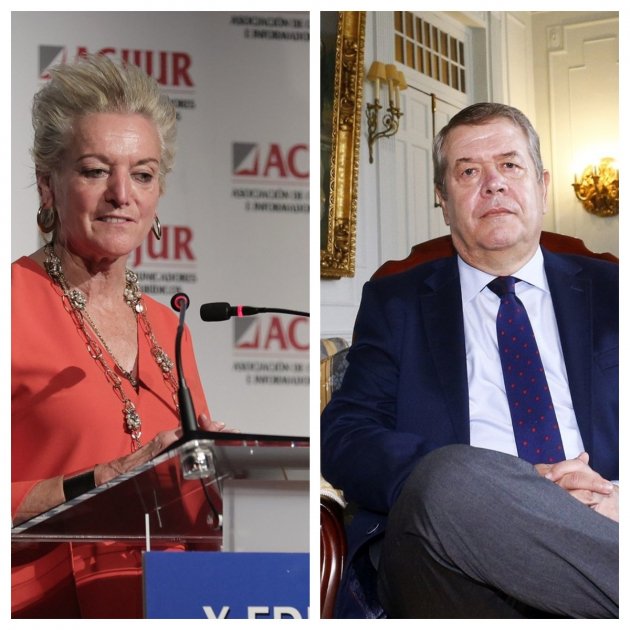Spain's main party of the right, the People's Party (PP), has prevailed in the country's judicial hierarchy and has thus broken the deadlock over the renewal of two Constitutional Court judges, after a second vote. Members of the General Council of the Judiciary (CGPJ) unanimously chose the two names: Supreme Court judge César Tolosa and retired Supreme Court judge María Luisa Segoviano. Although the latter had been regarded as a judge of progressive tendency, the pair were both proposed by the conservative wing of the politicized judicial governing body, with the progressives having to give up their own preferred candidate: José Manuel Bandrés. The judicial election took place a fortnight after Spain was plunged into an institution crisis when the Constitutional Court halted legislative passage of a government bill to reform the court itself. That move was followed by a plan from the Pedro Sánchez administration to counterattack with a new bill - but the Court, despite its internal division, made its own move first. In any case, the Spanish executive has welcomed the news.
The Spanish Constitutional Court is normally made up of twelve judges: four chosen by the lower house, the Congress of Deputies; four chosen by the Senate; two chosen by the Spanish government, and two chosen by the judges of the CGPJ. For about four months, the CGPJ has failed to renew its two judges, since agreement was impossible due to the current balance of forces on the CGPJ itself - eight progressive members and ten conservatives. The current system requires a three-fifths majority (11 votes) to send candidates to the Constitutional Court, as well as allowing each member to propose and vote for two candidates. Until the latest round of voting, members fell into blocs and none broke ranks to alter the balance. But this Tuesday, the PP's new strategy prevailed and the progressives gave in to the proposals of the conservatives. In other words, Tolosa and Segoviano will be the two judges of the Judiciary; Laura Díez and Juan Carlos Campo - both very close to the Socialist party - will be the choices of the Spanish government itself. The Constitutional Court itself will now have to validate these four judges in an extraordinary plenary session.
Evading the reform proposed by the executive
In the first vote on December 20th, the conservatives failed in the attempt to impose their magistrates: the aforementioned Tolosa and Pablo Lucas, who obtained 10 votes. The progressives put forward the same candidate as today, Bandrés, but he only obtained 7 votes - because Enrique Lucas abstained. In today's second vote, the names of Tolosa and Bandrés were still on the table. The new development was the name of Segoviano, who had already appeared in the initial list of the progressives. She was nominated at the request of the conservatives, who may or may not have wanted to circumvent the Spanish government's proposed law and avoid the appointment of Bandrés - at the beginning of the month they already manoeuvred against the executive's planned reform. The progressive sector thus gave in, abandoning its own first choice, Bandrés, and accepting Segoviano.
Among other changes, the reform that the Spanish government intended to carry out was to reduce the majorities required for appointments. In this way, the renewal of the court would have been unblocked, and each sector would have chosen its candidate: the progressives would thus have been sure of sending Bandrés to the Constitutional Court. The measure drew a lot of attention from the right and the PP appealed to the Constitutional Court itself, which suspended the upper house vote on the amendments that included this reform. The executive then announced that it would promote a bill with the same content as the amendments, in a way which could not be stopped by the same means. It is in this context that the conservatives decide to take action and the renewal of the Constitutional Court has finally been unblocked.
What about the Spanish government's reform?
In the final instance, the aim of the Spanish government's reform was to break the deadlock on the renewal of the court. Sánchez and his partners have an interest in regaining the progressive majority in the Constitutional Court to prevent several key pieces of social legislation from being overturned, especially given that 2023 is an election year. The conservatives were able to avoid the choice of Bandrés, by proposal another apparent progressive - Segoviano. Her name was accepted by both sides and the future of Pedro Sánchez's reform is up in the air. Media close to the executive such as El País predict that the law proposal will now not progress, since the purpose of renewing the court has been achieved. However, the remaining challenge is the renewal of the CGPJ itself, which has had its mandate expired for four years.
As multilateral organisms from the European Commission to the Council of Europe have frequently stressed, the renewal of the judicial hierarchy is urgent for the proper functioning of the Spanish justice system. The blockage of the PP to its renewal means that for now there are about sixty vacant positions in different courts throughout Spain. In fact, today's partial success in breaking one deadlock also means that a new vacant position is added: the one previously held by Tolosa. Tolosa's departure from the Supreme Court affects the functioning of that court's administrative disputes chamber, which already is ten judges short: it only has 23 of the 33 judges it should have. In early 2023 the situation will worsen, as a further judge is set to retire in March.
